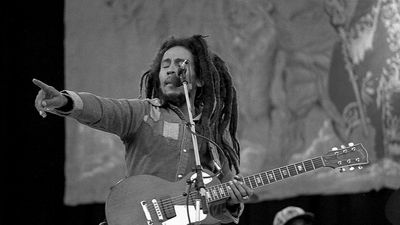Bob Marley was a pan-Africanist. His Rastafarian faith influenced a belief in the unity of African people across the globe—a perspective that's prominent in all of his music.
Throughout his years, the reggae legend wrote numerous songs against European imperialism and spoke out in support of the movement for Zimbabwean independence and against South African apartheid.
Marley first traveled to Africa in 1978, when he visited both Ethiopia and Kenya. Later, and more famously, he went to to Gabon and performed at Zimbabwe's Independence Day celebration in 1980.
Today, on Marley's birthday, we look back at a brief history of his time in Africa.
"Ethiopia Is His Spiritual Resting Place"
During his 1979 trip to Ethiopia, Marley stayed in Shashamane, “a communal settlement situated on 500-acres of land donated by His Majesty Emperor Haile Selassie I to Rastafarians that choose to repatriate to Ethiopia," his official website writes. Vanity Fair actually visited Shashamane a couple of years ago, calling it “Ethiopia's Rastafarian Utopia."
When asked about his religious beliefs, the singer once mentioned, "I would say to the people, Be still, and know that His Imperial Majesty, Emperor Haile Selassie of Ethiopia is the Almighty…. I don't see how much more reveal our people want. Wha' dem want? A white God, well God come black. True true." (from Steven Davis' Bob Marley: The Biography)
Marley was baptized into the Ethiopian Orthodox Church shortly before his death and his funeral used both Ethiopian Orthodox elements and Rastafari tradition. "Bob's whole life is about Africa, it is not about Jamaica," the singer's widow, Rita Marley, told The Guardian back in 2005. "Ethiopia is his spiritual resting place."

Bob Marley's rare "Selassie In The Chapel," a cover of Elvis' "Crying In The Chapel"
Marley & Zimbabwe's Liberation
Marley released the liberation struggle song "Zimbabwe" in 1979. He premiered it later that year at the Amandla Festival of Unity at Harvard Stadium in Boston, Massachusetts.
“During the years of Chimurenga, Bob Marley's music had been adopted by the guerrilla forces of the Patriotic Front; indeed, there were stories of ZANLA troops playing Marley cassettes in the bush," University of Zimbabwe professor Fred Zindi tells Forbes. “Certainly, Marley's music has potency and a commitment which goes far beyond simple entertainment. He now enjoys a special place in Third World culture; an artist who directly identifies with the black African struggle. Thus, he was the only outside artist asked to participate in Zimbabwe's independence celebrations."
In 1980, Marley performed a concert at Harare's Rufaro Stadium in celebration of Zimbabwean Independence.

Gabon
Marley controversially dated the daughter of Gabonese leader Omar Bongo. "When Marley went to Gabon, the country was a dictatorship. The regime of President Omar Bongo was built on oil wealth and was notorious for its corruption and repression of political opponents," writes Africa Is A Country.
A clip from the Marley documentary tells the story of how the singer agreed to play a birthday concert for Omar Bongo, unaware of his repressive politics. According to the documentary, Marley and his band only found out Bongo was a dictator after arriving in Gabon, but decided to play the concert anyways since they'd traveled that far.
In an interview with LargeUp, Marley director Kevin MacDonald speaks about the influence Pascaline Bongo had on Marley's pan-Africanism:
I had been told by a few people that [Pascaline Bongo] had been very important in the last years of his life, in introducing him to Africa. The first time he played in Africa he was invited by her father but her, really. That seemed like a key point in his life. Obviously Africa means so much to him. I thought here's a bizarre story, a strange individual in this incredibly luxurious environment and you feel like that's a million miles from Trenchtown, so that appealed to me. They'd had a relationship that went beyond just a girlfriend relationship, I think she'd been also instrumental in a couple things in his life. She visited him in Germany before he died.

"Africa Unite": An Anthem For Pan-African Solidarity
"Africa Unite / 'Cause we're moving right out of Babylon / And we're going to our Father's land / How good and how pleasant it would be before God and man / To see the unification of all Africans."
Marley recorded "Africa Unite" for the politically-charged 1979 album, Survival. Inspired by Marcus Garvey's call for Jamaicans and all people of African descent to return to Africa, the song sees Marley singing about "coming home" and leaving the imperialist Babylon.
"Africa, you're my forefather cornerstone."

- VIDEO: Seun Kuti Rips Hip-Hop A New One - OkayAfrica ›
- Listen to Naira Marley's New EP 'Lord of Lamba' - OkayAfrica ›
- MohBad & Naira Marley Connect For 'Komajensun' ›
- Watch Naira Marley's New Music Video for 'Tingasa,' Featuring C Blvck ›
- Bob Marley ›
- MohBad & Naira Marley Connect For 'Komajensun' - OkayAfrica ›
- Bob Marley's Posthumous Album, 'Africa Unite,' Fuses Reggae and Afrobeats in Majestic Celebration - Okayplayer ›
- What It’s Like To…Be A Reggae Promoter In South Africa - Okayplayer ›

